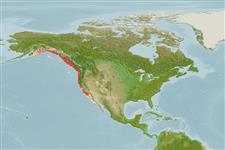Teleostei (teleosts) >
Perciformes/Scorpaenoidei (Scorpionfishes) >
Sebastidae (Rockfishes, rockcods and thornyheads) > Sebastinae
Etymology: Sebastes: Greek, sebastes = august, venerable (Ref. 45335); elongatus: From the Latin elongatus, meaning 'elongate' (Ref. 27436).
More on author: Ayres.
Environment: milieu / climate zone / depth range / distribution range
Ecology
Marine; demersal; depth range 25 - 425 m (Ref. 6793), usually 91 - 366 m (Ref. 6885). Temperate; 60°N - 27°N, 156°W - 114°W
Northeast Pacific: Chirikof Island in the Gulf of Alaska to Cedros Island, Baja California, Mexico.
Length at first maturity / Size / Weight / Age
Maturity: Lm 21.0, range 18 - ? cm
Max length : 39.0 cm TL male/unsexed; (Ref. 27437); max. published weight: 630.00 g (Ref. 40637); max. reported age: 54 years (Ref. 55701)
Dorsal spines (total): 13; Dorsal soft rays (total): 12 - 14; Anal spines: 3; Anal soft rays: 6. Head spines strong - nasal, preocular, postocular, tympanic and parietal spines present, supraocular, coronal and nuchal spines absent (Ref. 27437). 2nd anal fin spine long; body slender (Ref. 27437). Pinkish yellow in color, with 3 or 4 horizontal green stripes on body, light ventrally; green streaks on caudal fin membranes (Ref. 27437).
A common inhabitant of both inshore and offshore areas (Ref. 2850, 6885). Found on rocky as well as soft bottoms (Ref. 2850). Viviparous (Ref. 34817). Only the largest individuals are filleted for human consumption, smaller ones are processed into fishmeal or used as animal feed (Ref. 27436). The flesh has a delicious flavor and appealing texture (Ref. 27436). Rarely caught by sports anglers, but an excellent bait for large lingcod (Ref. 27436). Rare appearances in public aquariums (Ref. 27436).
Lamb, A. and P. Edgell, 1986. Coastal fishes of the Pacific northwest. Madeira Park, (BC, Canada): Harbour Publishing Co. Ltd., 224 p. (Ref. 27436)
IUCN Red List Status (Ref. 130435)
Threat to humans
Harmless
Human uses
Fisheries: commercial; aquarium: public aquariums; bait: usually
Tools
Special reports
Download XML
Internet sources
Estimates based on models
Preferred temperature (Ref.
123201): 5.7 - 8.8, mean 7 °C (based on 73 cells).
Phylogenetic diversity index (Ref.
82804): PD
50 = 0.5000 [Uniqueness, from 0.5 = low to 2.0 = high].
Bayesian length-weight: a=0.01000 (0.00499 - 0.02004), b=3.09 (2.92 - 3.26), in cm total length, based on LWR estimates for this Genus-body shape (Ref.
93245).
Trophic level (Ref.
69278): 3.7 ±0.5 se; based on size and trophs of closest relatives
Generation time: 11.2 ( na - na) years. Estimated as median ln(3)/K based on 2
growth studies.
Resilience (Ref.
120179): Very Low, minimum population doubling time more than 14 years (tmax=46; tm=9).
Prior r = 0.06, 95% CL = 0.04 - 0.09, Based on 1 full stock assessment.
Fishing Vulnerability (Ref.
59153): High vulnerability (63 of 100).
